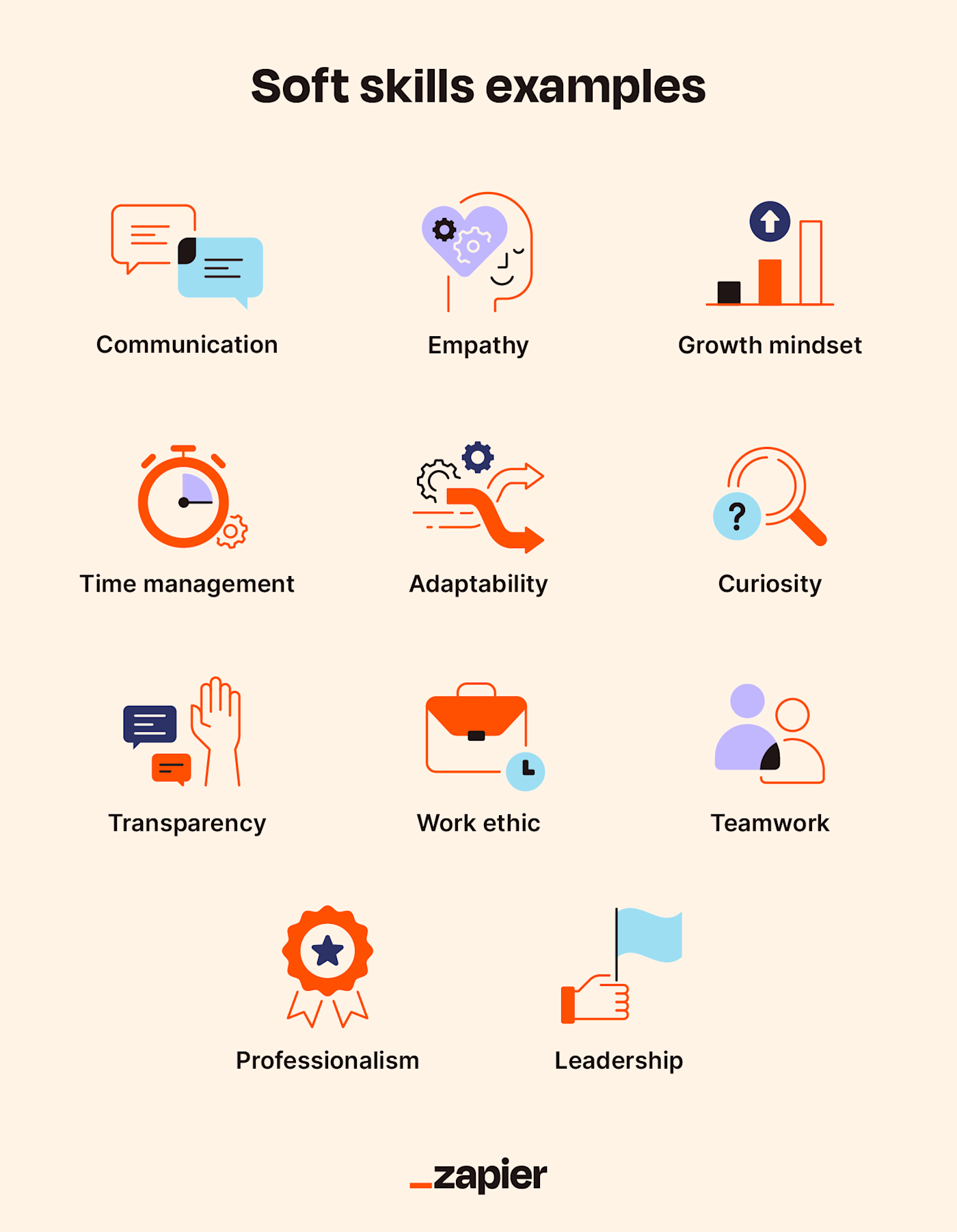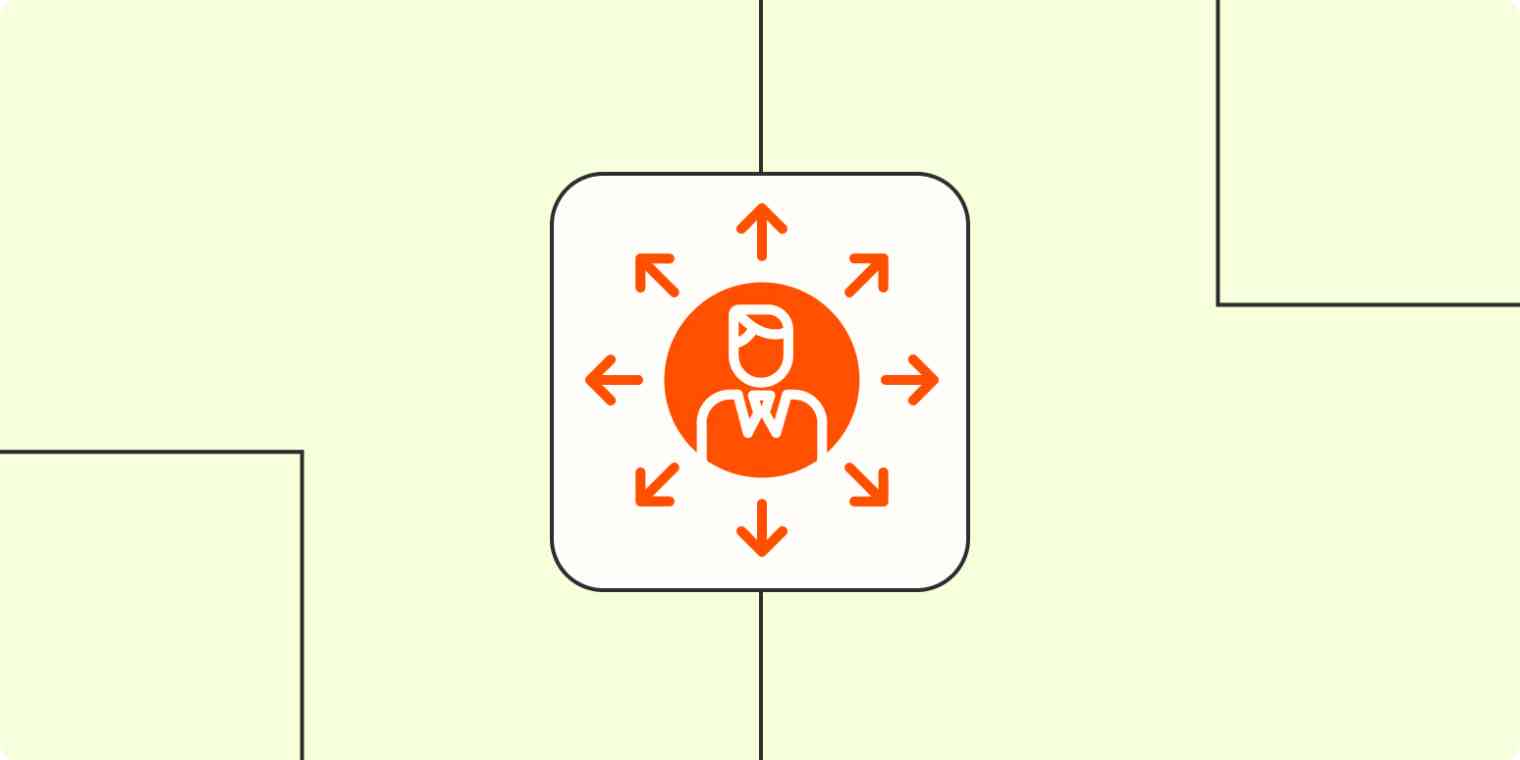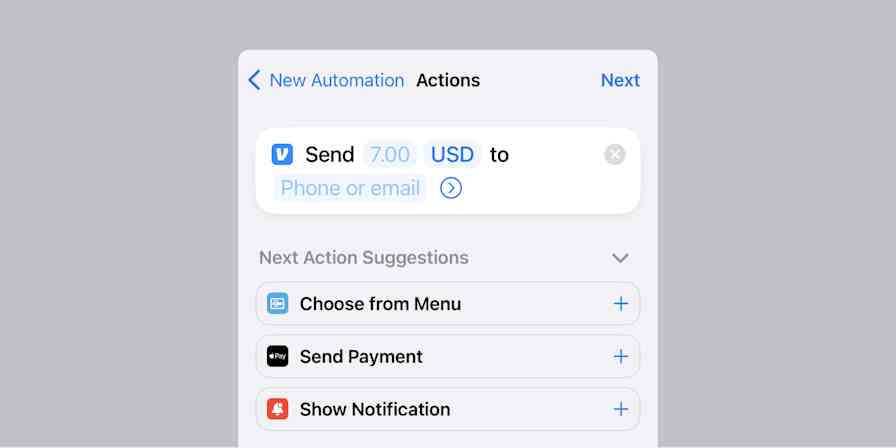My writing skills don't pay the bills on their own—my people skills pull their weight, too. While I'm always trying to become a better writer, there's way more that goes into managing work than technical skills alone. The same is true for almost every other job on the planet.
You can't entirely separate your job performance from who you are outside of work, and you shouldn't have to. Showing up with human-ness is the reason we haven't all been replaced by robots yet, and there are non-job-specific skills you need to grow in your career.
But the number of soft skills in the universe is basically infinite, so which ones matter most in the workplace? I asked people what traits they look for when hiring teammates and what they appreciate in their peers. These are the important soft skills at the top of everyone's list.
Table of contents:
What are soft skills?
Soft skills are personal strengths that help you collaborate, lead, create, and grow in your role. They're the perspectives, reactions, and mental frameworks you use that aren't exclusive to your job. Don't confuse the word "soft" with weak: you can lead with empathy and curiosity instead of ego and cruelty.
You can't be successful in a job without soft skills. The most competent IT manager in the world won't be good at their job if they can't communicate processes clearly to their team. The best copywriter on the planet won't get anything done if they can't manage their time and end up spending three weeks on a low-priority project that could have been done in a day.
Megan Kao, an investor at Contrary Capital, points out that technical and soft skills exist together, not as one or the other.
Incredible that in this day and age, I still hear people say that women aren’t as technical because they have good soft skills. Like it’s a zero sum game.
— Megan Kao (@megankao_) October 17, 2022
The most successful people are technical AND great people leaders.
Neither has to come at the expense of the other.
No matter how much you've honed your craft, it's nothing without soft skills to support it. And employers know that.
Soft skills vs. hard skills
While hard skills refer to the technical abilities you've acquired through some sort of training, education, or experience, soft skills are the less tangible personal qualities that help you succeed on the job. If hard skills are the base of your career pizza, soft skills are all the delicious toppings (and yes, that includes pineapple).
If all I had were hard skills like SEO writing, I'd basically be a robot—and in the age of AI, we have plenty of hard-skill-only robots to go around. To be a human, you need more. I know how to manage my time well and communicate empathetically—the soft skills that make me a well-rounded professional—and (hopefully?) tolerable to work with.
44 examples of soft skills you need to be successful at work
Here are the soft skills you need on your resume—and in action—in order to get hired and then be successful in your role.
1. Communication
Collaboration without communication is impossible. What does it mean to be an effective communicator, though? Everyone has different preferences, so part of the skill is being able to adapt your communication skills to the environment. How you speak to a strategic partner will be different from how you speak to your peer, for example. It's all about reading the room.
But there are a few things that are pretty relevant across the board. For starters, get to the point quickly. Stephen Levin, Head of Business Operations at Zapier, shared:
"I can't count how many presentations I watch in interviews that set up 10-15 minutes of context in a 25-minute presentation before giving any important information. Business communications isn't telling a narrative like literature or academic writing with context > argument > big reveal. You have to state the most important conclusion in the first minute/slide/paragraph. Then rebuild the narrative and justification."
Nick Polyushkin, the co-founder of Ofirio, similarly values open and direct dialogue.
"Discussing a subject directly rather than skirting it is essential in time-sensitive situations when an urgent response is required. A poor communicator will slow down your process and cause you to waste time."
If (and only if!) you have something valuable to say, say it quickly.
2. Writing
Communication isn't just about interviews, meetings, and video calls. The same rules apply to writing:
Take time to self-edit your writing, down to your emails and Slack messages.
Ask yourself, "Why should they care?" The more succinct you can be, the better. (And remember, no email should take more than five minutes to write.)
Especially if you're communicating asynchronously, offer all the necessary information upfront, so people don't have to ask you a bunch of questions to get what they need.
Being able to communicate effectively in writing—in a concise, clear, and engaging way—is a huge boon in a professional setting. No one wants to read a rambling treatise on Slack or sift through a nonsensical email to understand the actual ask.
3. Public speaking
While you may never need to deliver an organization-wide motivational speech, being able to confidently lead a presentation or speak on a call is an important skill, whether you interact with customers and clients or just your coworkers.
4. Responsiveness
Don't be the coworker that takes five business days to respond to a simple message. Just rip the Band-Aid off and reply in a timely fashion.
5. Empathy
Just because you're a clear communicator doesn't mean you have to be curt in your interactions. Yes, cold and self-centered people do sometimes get ahead, but more and more, empathy is winning. One of Zapier's values is "Empathy over ego"—the value is taken into consideration during the hiring process to be sure all teammates can live that value. Plenty of other organizations agree.
"Individuals who listen actively, show respect and empathy toward others, and collaborate well in a team setting make for great coworkers. Understanding where others are coming from and considering different perspectives will help improve team dynamics and problem-solving abilities," Caitlyn Parish, the founder and CEO of Cicinia, shared.
Mike Nemeroff, the CEO and co-founder of Rush Order Tees, adds that empathy is helpful in every kind of business interaction. "Being empathetic can help you become more compassionate and patient when dealing with challenging coworkers. Empathy also helps you relate to people better, which helps you form deeper and more meaningful connections with coworkers and managers," he noted.
One of the best ways to be more empathetic in your role is to talk to diverse people across teams. Ask them to tell you more about their experiences, what they're struggling with, and what they want to achieve.
Read more: How calls with random coworkers make remote work better—and more productive
6. Emotional intelligence
While you might spend hours imagining the nasty email you want to send to your boss, it's not the best career move. Emotional intelligence helps you manage your emotions (and keep your job).
7. Listening
If you want your jokes to land, you have to know your audience. So before you launch into your workplace standup routine, put your listening ears on.
8. Cultural intelligence
You know Michael Scott? Do the opposite. Spend time developing your cultural intelligence, so you can foster a more inclusive workplace.
9. Growth mindset
A growth mindset views failure as a catalyst for improvement, not as a personality trait. And while getting constructive feedback might sting, it's how you react to it—and learn from it—that will make or break your success at work.
Amy Gray, a business coach, wrote an article on accepting constructive feedback. She shared that feedback can help you gain confidence through self-awareness, earn trust from those around you, and become better at what you do. One of Amy's tips for listening to feedback without feeling defensive is to ask questions:
"You might be tempted to just listen, say thank you, and go on about your day. But if you can be truly open to what you are hearing and ask questions to help you understand the criticism more deeply, you are more likely to fully digest it and put it to positive use. Saying 'Tell me more about that' is a great way to open up the feedback to understand the other person's perception and feedback."
Related to growing through feedback is the ability to handle a straight-up "no." Paola Accettola, Principal and CEO of True North HR, shared that getting back up when knocked down is critical.
"So many people face rejection after rejection during the job search, and those who are resilient are more likely to be able to pivot and keep moving forward. This translates to being successful once you start your career, as you can be adaptable and face challenges head-on without the overwhelming fear of failure. Fortunately, resilience is a skill that can be taught. Unfortunately, however, it is best learned through experiencing failure."
You'd be hard-pressed to interview for a job and not get a question related to how you give or receive feedback, or how you handle adversity. Being able to show your skills in these areas can be a huge benefit when applying to new jobs.
Read more: Reframing rejection—3 ways to deal with it
10. Persistence
If your first shot at a new project is a huge success, kudos to you, but not all of us can be superheroes. For most people, persistence is necessary to see growth.
11. Results-oriented
If you've got your eye on that corporate ladder, you're going to have to produce some results. Even if the results aren't what you'd expected, showing that you're learning from them is just as good.
12. Goal-setting
If you can set your own relevant goals and develop a plan to achieve them, you'll always stay a step ahead. You can't be put on a PIP if you put yourself on one first.
13. Time management
I know this sounds like something a high schooler would say when applying for their first job, but let's face it: most adults also have trouble managing their time. It's even more true as people progress in their careers. When your workload grows but the number of hours in a workday stays the same, you have to find a way to work smarter.
Instead of a broad "time management" soft skill, you can break this one down further to be able to demonstrate how you manage your time. For example:
Determine when and how you work best
Focus by eliminating distractions
Track your time to better understand effort versus impact
Automate tedious tasks so you can focus on important work
In the end, time management is all about prioritization. Mark Pierce, CEO of Cloud Peak Law Group, shared: "There will always be a few things going on at once, and it's important to prioritize the most important tasks without sacrificing work on the others as well. With good time management, you can split your time wisely between tasks and not drop the ball."
Read more: Hack your calendar, to-do list, and work environment for optimal productivity
14. Organization
If your desktop is a dumpster fire of files, I hate to imagine what the inside of your brain looks like. Clean up your work, so you can boost your productivity and improve your time management.
15. Planning
Pretend you're the older sibling of your family, and learn how to plan. Speed matters, but if you go into something without a plan, it's hard to explain when results are less than stellar.
16. Delegation
It's scary to ask for help. But you know what else is scary? Crying hunched over a pint of Ben & Jerry's, watching Gilmore Girls for the 20th time because you feel the need to do the job of five people. Delegation isn't passing the buck—in the end, it'll make your entire organization more productive.

17. Adaptability
You'll always have restrictions, like limited time, budget, or staffing—so, you have to figure out how to work within constraints. And with the pace of change in the workplace (and the world more broadly), you need to be able to show that you're adaptable.
"Adapting to change and having a positive attitude about change go a long way to being successful throughout your career," David Watkins, the Director of Customer Experience at EthOS, shared. "Some examples could be a shift of strategic company priorities, a change in your role and responsibilities, or even a change in who manages you. While nobody can guess what's next, someone who's collaborative, empathetic, and organized will thrive when change inevitably comes—and that's the kind of employee companies want to work with and hire."
Read more: 3 ways to communicate like a leader in a changing workplace
18. Resourcefulness
Training? Onboarding? Support systems? Those things are non-existent in some workplaces. The ability to get crafty and still see results in not-so-ideal situations is the difference between "meets expectations" and "exceeds expectations."
19. Acceptance
There are going to be times you don't agree with the decisions your team makes. Unfortunately, no one appreciates the "I told you so" person. I know you're right, you know you're right, but no one else cares. So disagree and commit.
20. Open-mindedness
When you're presented with change, do you lean into it, or do you go into it kicking and screaming? Being able to go into new situations with an open mind shows that you're open to growth.
21. Curiosity
Many of the soft skills here involve asking questions—and that's all rooted in curiosity. Asking the right questions will allow you to see projects from a new perspective, which will help you contribute better to your team. Eric Doty, the Content Lead at Dock, shared:
"Asking 'why' and 'how' in every new situation opens so many doors. You'll learn how things work and how decisions are made. You'll look for new ways of doing things. You'll have more interesting conversations. You'll have more sources of inspiration. You'll have a better reason to say yes or no to projects or opportunities."
Curiosity is easy to demonstrate during the interview process. Learn as much as you can about the company you're applying to, and then ask questions. Not only will it show off your curiosity and interest in the company, but it can also demonstrate some of those "hard" skills (and an understanding of your role in particular) while you're at it.
Read more: How bad idea brainstorms have helped me get braver—and better—at work
22. Willingness to learn
Employers understand that you can't possibly know everything going into a job. As long as you're willing and able to learn, you're an asset.
23. Innovation
If you find a process that could be better, do you scramble to your boss for a solution, or do you brainstorm a way to improve it yourself?
24. Problem-solving
Figuring out how to navigate complex issues is a massive benefit for a team. On the flip side, sometimes the best kind of problem-solving is asking someone who knows the answer, so keep that in mind.
25. Transparency
It's easy to go with the flow and assume the folks around you know what they're talking about. They usually do—but that doesn't mean there's no room for improvement. The best workers are ones that observe what's happening and then push back if they think something should change.
This can mean everything from challenging outdated workplace norms to saying no to a request from your manager to pushing back against a strategy idea.
It's not an easy thing to do, but this kind of communication is massively important for you and your company:
It shows that you're invested. You're not just along for the ride; you want to make things better.
It demonstrates a deep understanding of company goals, if you're able to show how your thoughts are aligned with them.
It demonstrates your autonomy (another soft skill!) and shows off your expertise.
Of course, don't push back just for the sake of pushing back. That's the opposite of a soft skill and can indicate ego and a lack of empathy. Instead, start by observing, listening, and gathering context (there's that curiosity we talked about). Then, if you truly think something is off course, it's time to speak up respectfully: ask tough questions, provide evidence for your opinion, and offer alternative solutions.
If you work somewhere that doesn't value this kind of input, it might be time to put this soft skill to work for another company.
26. Confidence
It takes confidence to challenge office norms or speak up for yourself. If you strengthen this skill, everything (and I mean everything) else will come a little bit easier.
27. Critical thinking
The old trick of pretending to be frozen on Zoom doesn't really work anymore (did it ever?), so you have no choice but to process information on the spot. Use those critical-thinking skills your grade school teachers tried so hard to teach you.
28. Integrity
Integrity means standing firm that you're Team Jacob even when you know your boss is Team Edward. Stand by your man—and your workplace convictions.
29. Work ethic
Work ethic is a broad term, but it boils down to doing your job consistently and doing it well. This soft skill reflects an individual's commitment to their job and their ability to produce quality work.
Nesha Frazier, SHRM-CP certified recruitment consultant with 10 years of in-house and agency experience, believes it's not enough to have a good work ethic—you must also be able to demonstrate your work ethic.
"Work ethic can be subjective. I think it's vital to be able to understand how your role fits into the organization's goals and objectives so that you can clearly communicate your value, whether you're in a direct or indirect revenue-generating role. You need to be able to show that your activity actually produces value."
30. Self-motivation
Embody a micromanager, and kick yourself into gear. Managers love a direct report who can run their own ship.
31. Reliability
Aim to be someone your team can rely on to get things done on time—and done well. Just be sure you don't overdo it and end up taking on more work than you can manage.
32. Attention to detail
Don't be the person who hits send on a major project with a glaring spelling error. Instead, be the person who catches mistakes others miss, making you an invaluable asset to the team.
33. Teamwork
There are two kinds of people: those who played team sports growing up and those who have "jobs where I don't have to talk to anyone" in their search history. Teamwork doesn't come naturally to everyone.
"Candidates who position themselves as team players are incredibly valuable. Good teamwork involves being able to work well with various personalities, as well as different organizational, work, and communication styles. The ability to adapt well and collaborate with a diverse group of teammates is essential to the growth of any organization," shared Kayla Colbert, hiring specialist at Siege Media.
34. Helpfulness
Are you the kind of person to hold the elevator door or desperately push the close button while avoiding eye contact? Lending a hand even when you haven't been asked to will make you a standout team player.
35. Conflict resolution
You have two options: a) learn how to resolve conflict or b) continue to avoid Patty in the break room for the rest of time. It's your choice, really.
36. Collaboration
Workplaces are just a grown-up version of playground sandboxes. If you haven't figured out how to play well with others yet, it's time to learn.
37. Professionalism
Being professional might mean something different in each work setting, but the overall idea is to act in a way that reflects on the company well. This means being respectful, positive, and trustworthy.
It may also mean building a professional image for yourself. How do you present yourself to your colleagues or clients? For some, this might mean throwing on a blazer, and for others, it might mean bringing your emoji usage down 20%.
As Yamini Rai, soft skills trainer and HR head at The Viral Pink, believes:
"Professionalism is vital as it sets the tone for how employees represent themselves and the company. Candidates with professional demeanor can help build trust and credibility with clients, customers, and colleagues."
38. Positivity
Nobody likes that one coworker who's always complaining that they'd rather be sipping a piña colada in the tropics right now. A positive attitude sets the tone for a harmonious work environment, which can only lead to more job satisfaction and success in your role.
39. Credibility
There's a wide gap between imposter syndrome and someone who took "fake it 'til you make it" way too far. Find some happy middle ground and establish yourself as a credible source.
40. Manners
Although it may seem obvious, being polite goes a long way. Mind your P's and Q's, and practice gratitude whenever you can.
41. Leadership
A leader may be someone who manages a team, but it could also be a colleague who takes charge of a project or initiative. Regardless of position, effective leaders create a shared vision and inspire others to work toward achieving it.
Sean Stevens, director of Immerse Education, says, "Strong leaders are comfortable with making difficult calls and are experts at keeping things and people on track. They have the ability to plot a course of action and inspire their team to work together to achieve it. You may improve your company's output and morale, and prepare the next generation of managers by prioritizing individuals who have good leadership abilities in their job applications."
42. Mentorship
Don't gatekeep how you created a stellar meeting agenda in two and a half minutes. Share your knowledge with the rest of your team wherever you can.
43. Initiative
While I also wish someone could just tell me what to do at all times, being in the corporate world requires showing a little initiative. Don't spiral—just pick something you could reasonably do, and try to make an impact on your team.
44. Decision-making
Great leaders can make great decisions without breaking a sweat. But this doesn't mean acting impulsively—you have to know how to quickly take in context and feedback to make the best possible choice.
How to improve soft skills
The good news is: you already have soft skills. In fact, you've been learning them since preschool. But you can continue to practice the ones you have and hone the ones you struggle with. Here's how.
Talk to your peers and managers. Ask them about your strengths and areas of improvement. They may notice things you don't or have advice on what skills your organization needs right now.
Think about what skills leave a positive impression on you. Who do you like to work with? What is it about those people that makes them easy to work with or leads to them being valued members of the team? How can you embody those traits?
Look at job descriptions in your industry. Most employers will list soft skills in their job postings. See if you can find patterns or trends in these descriptions to help you prioritize which soft skills matter the most for your role.
Target one skill at a time. Honestly, growing soft skills can be exhausting. That's why I recommend targeting one at a time, so you don't burn out on self-improvement.
How to choose soft skills for your resume
Let's say you're an overachiever, and you've checked off quite a few of the soft skills on this list. Which ones do you choose to highlight on your resume?
First, you should consider the specific needs of the job and company you're applying to. Review the job description to identify skills the ideal candidate would have to be successful in the position. For example, if the position requires collaboration with a diverse team, you may want to highlight your interpersonal and cultural intelligence skills.
Of course, you should also focus on soft skills you truly excel at. The soft skills you include might also pop up during an interview. Could you tell a story about how you've put this soft skill into practice in the workplace? If not, it may not be your strongest skill to include.
Similarly, the best way to include your soft skills in your resume is to naturally weave them into your experience bullet points. Show potential employees how you exemplify that skill—don't just pile them all into a meaningless list.
How to assess soft skills in candidates and employees
Assessing soft skills in job candidates and current employees is an important part of the hiring and performance evaluation process. Here are some tips on how hiring managers and other HR professionals can assess soft skills effectively:
Use behavioral interview questions: Behavioral interview questions prompt candidates to provide specific examples of how they've demonstrated a particular soft skill in the past. For example, you could ask a candidate to describe a time they had to deal with a stressful situation. Pay attention to the candidate's response, and look for evidence that they possess the soft skill you're assessing.
Conduct skill assessments: Skills assessments can help evaluate a candidate's ability to perform specific tasks related to the desired soft skill. You could ask the candidate to complete a project requiring collaboration, communication, or problem-solving. Review their performance based on the soft skill.
Seek feedback from others: Asking for feedback from a candidate's or employee's supervisors, colleagues, or clients can provide valuable insights into their soft skills. Consider using a 360-degree feedback approach that collects feedback from multiple sources.
Whether you learn new skills to impress your boss or figure out which existing soft skills to list on your resume to land your dream job, developing these soft skills can help you become more successful in your career and build stronger professional relationships.
Related reading:
This article was originally published in October 2022. The most recent update was in April 2023 with contributions from Cecilia Gillen.





